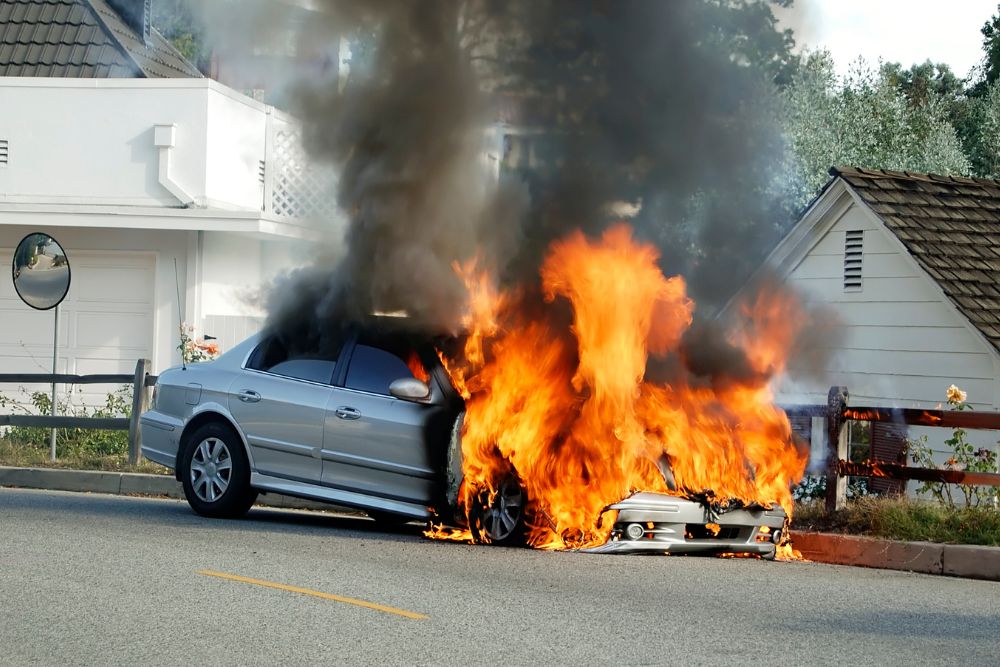Electrical fires in vehicles are a serious and potentially life-threatening issue. These fires can occur suddenly, often giving little warning to the driver or passengers.
This article will explore effective strategies for preventing electrical fires in your vehicle. From regular maintenance and awareness of warning signs to the importance of seeking professional help, we’ll ensure you have all the information you need to keep your car safe from this preventable hazard.
Understanding the Causes of Electrical Fires in Vehicles
Faulty Wiring Systems
One of the primary causes of electrical fires in vehicles is faulty wiring. Over time, the wiring in your car can deteriorate due to age, exposure to extreme temperatures, or physical damage. Frayed, exposed, or damaged wires can create short circuits and generate heat, which can ignite a fire. Ensuring that your car’s wiring is intact and in good condition is crucial in avoiding this type of hazard.
Improper modifications, such as installing aftermarket accessories like sound systems or additional lighting without professional oversight, can also overload the electrical system. This creates a higher risk of electrical fires, as these installations may exceed the electrical capacity of your vehicle.
Battery and Alternator Issues
The battery and alternator are essential components of your car’s electrical system, and problems with either can lead to electrical fires. A failing alternator or damaged battery may overheat, leak acid, or develop internal electrical resistance that causes sparks. Overcharging a battery is particularly dangerous, as it can result in a thermal runaway reaction.
Using incompatible or low-quality batteries is another contributing factor. Always choose a high-quality, professionally recommended battery that suits your vehicle’s specifications to avoid potential hazards.
Overheated Components
Overheating is another significant contributor to vehicle electrical fires. Electrical components like fuses, relays, or motors can generate excessive heat when there is resistance, a poor electrical connection, or overuse. A common example is the overheating of the cigarette lighter port when used to power devices that exceed its designed capacity.
Regularly inspecting these components and ensuring they perform at an optimal temperature can significantly reduce your risk of an electrical fire.
Key Steps to Prevent Electrical Fires in Your Vehicle
Schedule Routine Inspections
One of the most effective ways to prevent electrical fires is to have your vehicle inspected regularly by an experienced auto electrician. During these inspections, professionals can detect hidden issues like frayed wires, loose connections, or malfunctioning components before they escalate into potentially disastrous problems.
In New Zealand, where weather conditions can include high humidity and sudden temperature drops, exposure to these elements can accelerate the deterioration of your car’s electrical system. Maintenance checks ensure these environmental factors do not go unnoticed.
Address Warning Signs Immediately
Being vigilant about warning signs can save you from costly damage and accidents. Common indicators of electrical problems include burning smells, flickering lights, blown fuses, or unexpected failure of electrical components. If you notice anything unusual, seek professional assistance promptly rather than attempting a DIY fix, as improper repairs can further increase the risk.
For example, a burning odour is often associated with overheating wires or melting insulation. This is a red flag that should never be ignored. Acting quickly when these warning signs arise can prevent minor electrical issues from evolving into catastrophic fires.
Use Quality Parts and Installations
Always ensure that replacement parts and aftermarket installations are of high quality and fit your vehicle’s specifications. Cheaper, low-quality parts may save money in the short term but can compromise the safety of your car’s electrical system.
When installing any non-standard equipment, such as GPS systems or dashcams, make sure they are installed by certified professionals. Auto electricians are skilled at ensuring that all connections are secure and that the car’s electrical system is not overloaded.
Store Flammable Items Properly
Flammable liquids, such as petrol, cleaning solvents, or even aerosols, should never be stored inside the vehicle’s cabin, especially near electrical components. In the unfortunate event of a short circuit, having flammable items nearby increases the likelihood of a fire significantly.
Instead, store these materials in appropriate containers and locate them away from sources of heat and electricity. Avoid placing flammable objects around the battery area or fuse box, as these are hotspots for electrical activity.
Common Electrical Fire Scenarios and How to Avoid Them
Accidents Involving Flooded Roads
Driving through deep or flooded roads can damage your car’s electrical systems, leading to short circuits later on. In New Zealand, areas prone to flooding during heavy rain make this a frequent issue for drivers. Water can seep into the electrical components, causing corrosion and unexpected malfunctions.
If your vehicle has been exposed to flooding, have it inspected immediately by professionals. Drying electrical components improperly often leaves moisture trapped, putting your car at risk of a future electrical fire.
Improper Jump-Starting Procedures
Jump-starting a vehicle incorrectly can result in sparks, electrical overload, and damage to sensitive car components. Always follow the manufacturer’s guidelines for jump-starting your vehicle or have a professional perform the task for you. This reduces the risk of overheating and accidental fire.
Additionally, keep an eye on the condition of jumper cables. Using damaged or frayed cables for jump-starting can lead to short circuits and other hazards.
Why Professional Help Is Essential
The Complexity of Modern Electrical Systems
Modern vehicles are equipped with increasingly complex electrical systems, making DIY troubleshooting risky and impractical. Today’s cars integrate advanced features, such as backup cameras, in-cabin sensors, and navigation systems, all of which rely on stable electrical operation.
Professional auto electricians are trained to diagnose intricate systems and provide tailored solutions. Attempting to repair problems without proper expertise can exacerbate the issue and compromise not only your car but also your safety.
Peace of Mind Through Expert Service
Booking an inspection or repair service with experienced professionals like Eurosparx ensures that your vehicle receives top-tier attention. Certified auto electricians can identify issues that might otherwise go unnoticed, delivering peace of mind and long-lasting results.
Investing in expert assistance prevents further complications, ensuring your car remains safe and reliable for years to come.
Get Expert Help to Prevent Electrical Fires in Your Vehicle
Preventing electrical fires in your vehicle is all about regular maintenance, timely inspections, and using high-quality components. As experienced auto electricians in Auckland, Eurosparx can help you ensure your car’s electrical systems remain in optimal condition. From professional diagnostics to expert installations, we provide the solutions you need to stay safe on the road. Contact our team today by calling 09 218 7789.


